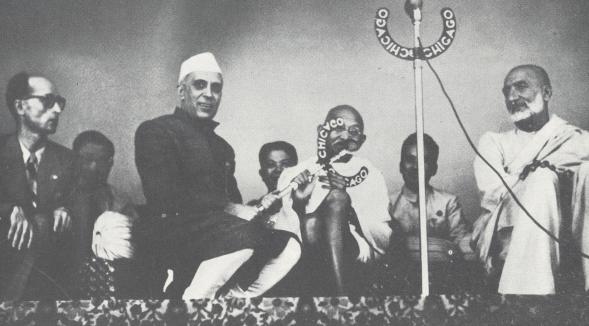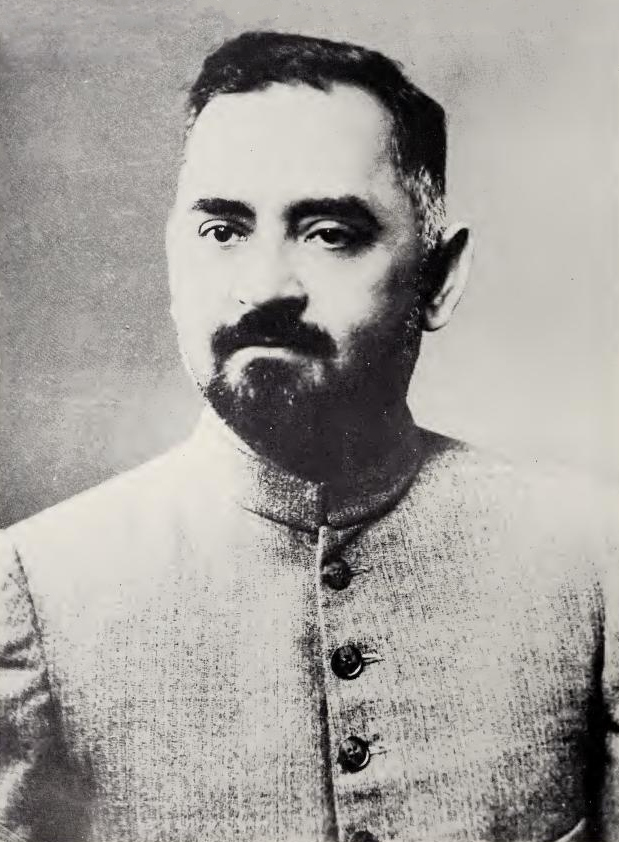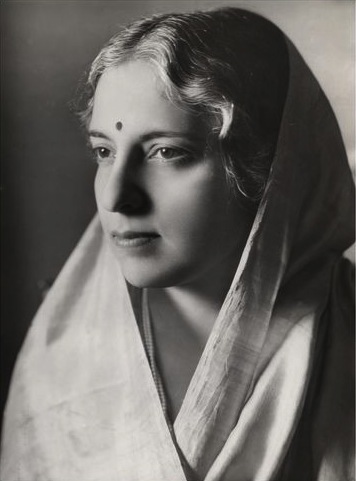|
Asian Relations Conference
The Asian Relations Conference was an international conference that took place in New Delhi from 23 March to 2 April, 1947. Organized by the Indian Council of World Affairs (ICWA), the Conference was hosted by Jawaharlal Nehru, then the Vice-President of the interim Viceroy's Executive Council, and presided by Sarojini Naidu. Its goal was to promote cultural, intellectual and social exchange between Asian countries. Envisioned to be non-political, the Conference included almost all Asian countries, as well as several independence movements. These included nations and communities that were on opposing sides, which inevitably raised political questions. Though the conference achieved an immediate sense of solidarity among Asian nations and saw the establishment of the Asian Relations Organisation, suspicions of an Indian or Chinese hegemony held by the minor nations did not allow the organisation to be effective, nor the second Asian Relations Conference held in 1950 to be as suc ... [...More Info...] [...Related Items...] OR: [Wikipedia] [Google] [Baidu] |
Jawaharlal Nehru At The Asian Relations Conference, Delhi, March-April 1947
Pandit Jawaharlal Nehru (; ; ; 14 November 1889 – 27 May 1964) was an Indian anti-colonial nationalist, secular humanist, social democrat— * * * * and author who was a central figure in India during the middle of the 20th century. Nehru was a principal leader of the Indian nationalist movement in the 1930s and 1940s. Upon India's independence in 1947, he served as the country's prime minister for 16 years. Nehru promoted parliamentary democracy, secularism, and science and technology during the 1950s, powerfully influencing India's arc as a modern nation. In international affairs, he steered India clear of the two blocs of the Cold War. A well-regarded author, his books written in prison, such as ''Letters from a Father to His Daughter'' (1929), '' An Autobiography'' (1936) and ''The Discovery of India'' (1946), have been read around the world. During his lifetime, the honorific Pandit was commonly applied before his name in India and even today too. Th ... [...More Info...] [...Related Items...] OR: [Wikipedia] [Google] [Baidu] |
Asaf Ali
Asaf Ali (11 May 1888 – 2 April 1953) was an Indian independence fighter and noted Indian lawyer. He was the first Indian Ambassador to the United States. He also served as the Governor of Odisha. Education Asaf Ali was educated at St. Stephen's College, Delhi. He was called to bar from Lincoln's Inn in England. Indian National Movement In 1914, the British attack on the Ottoman Empire had a large effect on the Indian Muslim community. Asaf Ali supported the Turkish side and resigned from the Privy Council. He saw this as an act of non-cooperation and returned to India in December 1914. Upon his return to India, Asaf Ali became heavily involved in the nationalist movement. He was elected to the Central Legislative Assembly in 1935 as a member of the Muslim Nationalist Party. He then became significant as a Congress member and was appointed deputy leader. The last of several spells of imprisonment which Asaf Ali courted during the freedom movement was in the wake of the 'Q ... [...More Info...] [...Related Items...] OR: [Wikipedia] [Google] [Baidu] |
Princely State
A princely state (also called native state or Indian state) was a nominally sovereign entity of the British Raj, British Indian Empire that was not directly governed by the British, but rather by an Indian ruler under a form of indirect rule, subject to a subsidiary alliance and the suzerainty or paramountcy of the the Crown, British crown. There were officially 565 princely states when India and Pakistan became independent in 1947, but the great majority had contracted with the viceroy to provide public services and tax collection. Only 21 had actual state governments, and only four were large (Hyderabad State, Mysore State, Kashmir and Jammu (princely state), Jammu and Kashmir State, and Baroda State). They Instrument of accession, acceded to one of the two new independent nations between 1947 and 1949. All the princes were eventually pensioned off. At the time of the British withdrawal, 565 princely states were officially recognised in the Indian subcontinent, apart from t ... [...More Info...] [...Related Items...] OR: [Wikipedia] [Google] [Baidu] |
Tata Group
The Tata Group () is an Indian multinational conglomerate headquartered in Mumbai. Established in 1868, it is India's largest conglomerate, with products and services in over 150 countries, and operations in 100 countries across six continents. Acknowledged as the founder of the Tata Group, Jamsetji Tata is sometimes referred to as the "father of Indian industry". Each Tata company operates independently under the guidance and supervision of its own board of directors and shareholders. Philanthropic trusts control over 66% of the Tata holding company Tata Sons, while the Tata family is a very small shareholder. The group's annual revenue for fiscal year 2021–22 was reported to be US$128 billion. There are 29 publicly-listed Tata Group companies with a combined market capitalisation of $311 billion as of March 2022. Significant Tata Group affiliates include Tata Consultancy Services, Tata Consumer Products, Tata Motors, Tata Power, Tata Steel, Voltas, Titan Company, Tanishq ... [...More Info...] [...Related Items...] OR: [Wikipedia] [Google] [Baidu] |
Birla Family
The Birla family is a family connected with the industrial and social history of India. Foundations The Birla family origins lie with the Maheshwari caste of Bania Vaishya traders but they were outcast from their traditional community in 1922 when one of their member, Rameshwar Das Birla, was thought to have broken the caste marriage rules. They are Marwari and by convention merchants from Rajasthan are termed Marwari. The family originates from the town of Pilani in the Shekhawati region in North-east Rajasthan. They still maintain their residence in Pilani and run several educational institutions there, including the BITS, Pilani. Shiv Narayan Birla In Pilani during the early 19th century lived Seth Shobharam, grandson of Seth Bhudharmal, a local tradesman of modest means. It was his son, Seth Shiv Narayana (1840–1909), who first ventured outside Pilani. At this time, Ahmedabad was the railhead which serviced trade from a large region of northwest India. Goods (mainly cott ... [...More Info...] [...Related Items...] OR: [Wikipedia] [Google] [Baidu] |
Interim Government Of India
The Interim Government of India, also known as the Provisional Government of India, formed on 2 September 1946 from the newly elected Constituent Assembly of India, had the task of assisting the transition of British India to independence. It remained in place until 15 August 1947, the date of the independence (and partition) of India, and the creation of Pakistan. Formation After the end of the Second World War, the British authorities in India released all political prisoners who had participated in the Quit India movement. The Indian National Congress, which had long fought for self rule, agreed to participate in elections for a constituent assembly, as did the Muslim League. The newly elected government of Clement Attlee dispatched the 1946 Cabinet Mission to India to formulate proposals for the formation of a government that would lead to an independent India. The elections for the Constituent Assembly were not direct elections, as the members were elected from each of ... [...More Info...] [...Related Items...] OR: [Wikipedia] [Google] [Baidu] |
Ishtiaq Hussain Qureshi
Ishtiaq Hussain Qureshi ( ur, ) (20 November 1903 – 22 January 1981) popularly known as I.H. Qureshi, ''SP'', ''HI'', was a Pakistani conservative nationalist historian and playwright. He was the Vice Chancellor of the University of Karachi from 1961 till 1971. An early activist of the historic Pakistan Movement, Qureshi served in the ministries of education and frontier regions as the secretary; in addition, he was elected a member of the parliament of Pakistan. But, due to his association with academia, he resigned from his government appointments and joined the academic faculty at the Columbia University as a professor of South Asian history. But soon, he returned to Pakistan and founded the National Language Authority (NLA) in the 1970s and helped set up the History Department at the University of the Punjab. Later, Qureshi joined the faculty of history at the University of Karachi where he remained the remainder of his life. Qureshi is also credited for editing ... [...More Info...] [...Related Items...] OR: [Wikipedia] [Google] [Baidu] |
Zakir Husain (politician)
(8 February 1897 – 3 May 1969) known as Dr. Zakir Husain, was an Indian educationist and politician who served as President of India from 13 May 1967 until his death on 3 May 1969. Born into an Afridi Pashtun family in Hyderabad, Husain studied in Etawah, the Muhammadan Anglo-Oriental College, Aligarh and the University of Berlin from where he obtained a doctoral degree in economics. He was a founding member of the Jamia Milia Islamia of which he served as Vice-chancellor during 1926 to 1948. He was closely associated with Mahatma Gandhi and was chairman of the Basic National Education Committee which framed a new educational policy known as Nai Talim with its emphasis on free and compulsory education in the first language. Appointed Vice Chancellor of the Aligarh Muslim University in 1948, he helped retain it as a national institution of higher learning. For his services to education, he was awarded the Padma Vibhushan in 1954 and was a nominated member of the Indian ... [...More Info...] [...Related Items...] OR: [Wikipedia] [Google] [Baidu] |
Vijaya Lakshmi Pandit
Vijaya Lakshmi Pandit ('' née'' Swarup Nehru; 18 August 1900 – 1 December 1990) was an Indian diplomat and politician who was the 6th Governor of Maharashtra from 1962 to 1964 and 8th President of the United Nations General Assembly from 1953 to 1954, the first woman appointed to either post. Hailing from a prominent political family, her brother Jawaharlal Nehru was the first Prime Minister of independent India, her niece Indira Gandhi the first female Prime Minister of India and her grand-nephew Rajiv Gandhi was the sixth Prime Minister of India. Despite her minimal education ( she was schooled entirely at home), Nehru showered her with diplomatic favours, sending Pandit to London as India's most important diplomat after serving as india's envoy to the Soviet Union, the United States and the United Nations. Her time in London offers insights into the wider context of changes in Indo–British relations. Her High-Commissionership was a microcosm of inter-governmental relat ... [...More Info...] [...Related Items...] OR: [Wikipedia] [Google] [Baidu] |
Bidhan Chandra Roy
Bidhan Chandra Roy (1 July 1882 – 1 July 1962) was an Indian physician, educationist, and statesman who served as Chief Minister of West Bengal from 1948 until his death in 1962. Roy played a key role in the founding of several institutions and the cities Bidhannagar and Kalyani. In India, the National Doctors' Day is celebrated in his memory every year on the 1st of July. He was awarded the Bharat Ratna, India's highest civilian honour in 1961. Early life and education Bidhan Chandra Roy was born on 1 July 1882 to a Bengali Kayastha family in Bankipore in Patna, where his father, Prakash Chandra Roy, was serving as an excise inspector. His mother, Aghorkamini Devi, was religious and a devoted social worker. Bidhan was the youngest of five siblings – he had 2 sisters, Susharbashini and Sarojini, and 2 brothers, Subodh and Sadhan. Bidhan's parents were ardent Brahmo Samajists. Prakash Chandra was a descendant of the family of Maharaja Pradapaditya, the rebel Hindu ki ... [...More Info...] [...Related Items...] OR: [Wikipedia] [Google] [Baidu] |
Kamaladevi Chattopadhyay
Kamaladevi Chattopadhyay (3 April 1903 – 29 October 1988) was an Indian social reformer and freedom activist. She was most remembered for her contribution to the Indian independence movement; for being the driving force behind the renaissance of Indian handicrafts, handlooms, and theatre in independent India; and for upliftment of the socio-economic standard of Indian women by pioneering the co-operation. She is the first lady in India to stand in elections from Madras Constituency although she lost in the elections but she pioneered the path for the women in India. Several cultural institutions in India today exist because of her vision, including the National School of Drama, Sangeet Natak Akademi, Central Cottage Industries Emporium, and the Crafts Council of India. She stressed the significant role which handicrafts and cooperative grassroot movements play in the social and economic upliftment of the Indian people. To this end she withstood great opposition both before and ... [...More Info...] [...Related Items...] OR: [Wikipedia] [Google] [Baidu] |
Hansa Jivraj Mehta
Hansa Jivraj Mehta (3 July 1897 – 4 April 1995) was a reformist, social activist, educator, independence activist, feminist and writer from India. Early life Hansa Mehta was born in a Nagar Brahmin family on 3 July 1897. She was a daughter of Manubhai Mehta, Dewan of Baroda State, and the granddaughter of Nandshankar Mehta, the author of the first Gujarati novel ''Karan Ghelo''. She graduated with Philosophy in 1918. She studied journalism and sociology in England. In 1918, she met Sarojini Naidu and later Mahatma Gandhi in 1922. She was married to Jivraj Narayan Mehta, an eminent physician and administrator who was the first Chief Minister of Gujarat. Career Politics, education and activism Hansa Mehta organized the picketing of shops selling foreign clothes and liquor, and participated in other freedom movement activities in line with the advice of Mahatma Gandhi. Later She established Desh Sevika Dal in 1930. She was even arrested and sent to jail by the British a ... [...More Info...] [...Related Items...] OR: [Wikipedia] [Google] [Baidu] |








